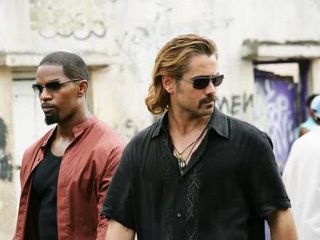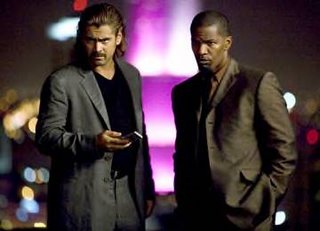Dispelling Myths About Miami Vice

Since it's TV-to-big-screen adaptation was announced, I've found myself confused by the insistence of the general public and critical world that Miami Vice is going to suck neon-lit, 80s pastiche, art deco butt. Well, it doesn't. Is it a stand alone feature that was inspired and adapted by the series' original creators and producers? Yes. Do they think so little of their ideas that they merely homage the original with tongue-in-cheek distaste in order to skive along on the recent bandwagon of television-to-feature tedium? No. Is poor Colin Farrell finally going to transcend his apparent status as Hollywood's most invisible leading action man? ... Um... who knows?
What Michael Mann has created is a grim and cynical cop/drug bust movie. Is that all? No. Despite what lazy critics might lead you to believe, it's never that simple people. This film isn't Heat, by any means, it's Miami Vice. A different film. Thank you Michael, we all appreciate the fact that you don't just recycle all of your films. What we don't appreciate is high school criticism parading around as professional competence.
[Enter: The Doofus]
Eric D. Snider, illustrious cheap thrill enthusiast and apparent film-hater (whom I have previously posted on here), seems to have had his assumptions that this was going to be Charlie's Angels dashed into reductive pieces.
He begins his review of Miami Vice by saying,
What Michael Mann -- executive producer of the TV series and writer/director of the new film -- has done is take that story and strangle all the fun out of it... The fact that I've never seen an episode of "Miami Vice" does not appear to be a liability.
He continues,
Mann's films tend to be melancholy, even somber ("Ali," "Collateral," etc.), but never has he seemed so hell-bent on dreariness. The story, easily handleable in a two-part TV episode, is stretched out for 133 minutes, its themes repeated endlessly. Occasional bursts of action provide temporary respite. Then it's back to the dreariness.
 Does this all mean that I thought Miami Vice was prefect? Definitely not. My purpose here is to encourage people to stop making/listening to stupid criticism that rails on it for not being another Michael Mann film or claiming that it is worthless and shallow. Michael Mann may be the best director since Michelangelo Antonioni or Andrei Tarkovski at commenting on humankind's relationship with themselves and with nature. Whether it takes place in Los Angeles or Miami, Mann's films build on characters in morally distressed situations that resemble similar themes found in Antonioni's Mediterranian or Tarkovski's deep space. The simple fact that Crocket and Tubbs are vice cops working under cover doesn't make their respective moral and physical battles in urban and rural environments any less of a comment on the paradox of 'fighting' conflict or discovering/losing humanity.
Does this all mean that I thought Miami Vice was prefect? Definitely not. My purpose here is to encourage people to stop making/listening to stupid criticism that rails on it for not being another Michael Mann film or claiming that it is worthless and shallow. Michael Mann may be the best director since Michelangelo Antonioni or Andrei Tarkovski at commenting on humankind's relationship with themselves and with nature. Whether it takes place in Los Angeles or Miami, Mann's films build on characters in morally distressed situations that resemble similar themes found in Antonioni's Mediterranian or Tarkovski's deep space. The simple fact that Crocket and Tubbs are vice cops working under cover doesn't make their respective moral and physical battles in urban and rural environments any less of a comment on the paradox of 'fighting' conflict or discovering/losing humanity.
Mann implements a number of interesting formal techniques here. The use of silence is very effective in illustrating the feeling of disbelief and wavering sense of bearing. Several times sound would cut completely, as we watch a character carry on a telephone conversation, or respond to a particular situation. In these scenes, not only do we not hear the dialog, but we don't hear music or ambient noise either and are left to gather the story elements from other characters' reaction shots - a huge improvement over Collateral, in which I thought more than a few scenes were botched by lame audio edits and annoying music.
The use of camera focus also makes us consider who/what is important. The overall cinematography embraces a documentary style, with shaky pans and quick rack focus, and several times the camera would frame a character (usually in extreme close-up) and remain out of focus. Which makes us wonder who/what is in focus? Are our heros maybe too entrenched in the under cover nature of their seedy business that they have lost moral focus? I would say, yeah.
These themes are crammed into a fairly straight forward cop/drug bust plot complete with pros and cons. To reduce a movie like this down to what it isn't, rather than what it is, is cheap and lazy. Take the time to think about the details and the elements that make you uncomfortable or interested; They are there, but you may have to put forth a little effort to notice.

Click image for wallpaper
[Link to Snider's full review]
Tagged under:
Entertainment, Miami Vice
Labels: Critical Studies, Film, News, Reviews


0 Comments:
Post a Comment
<< Home